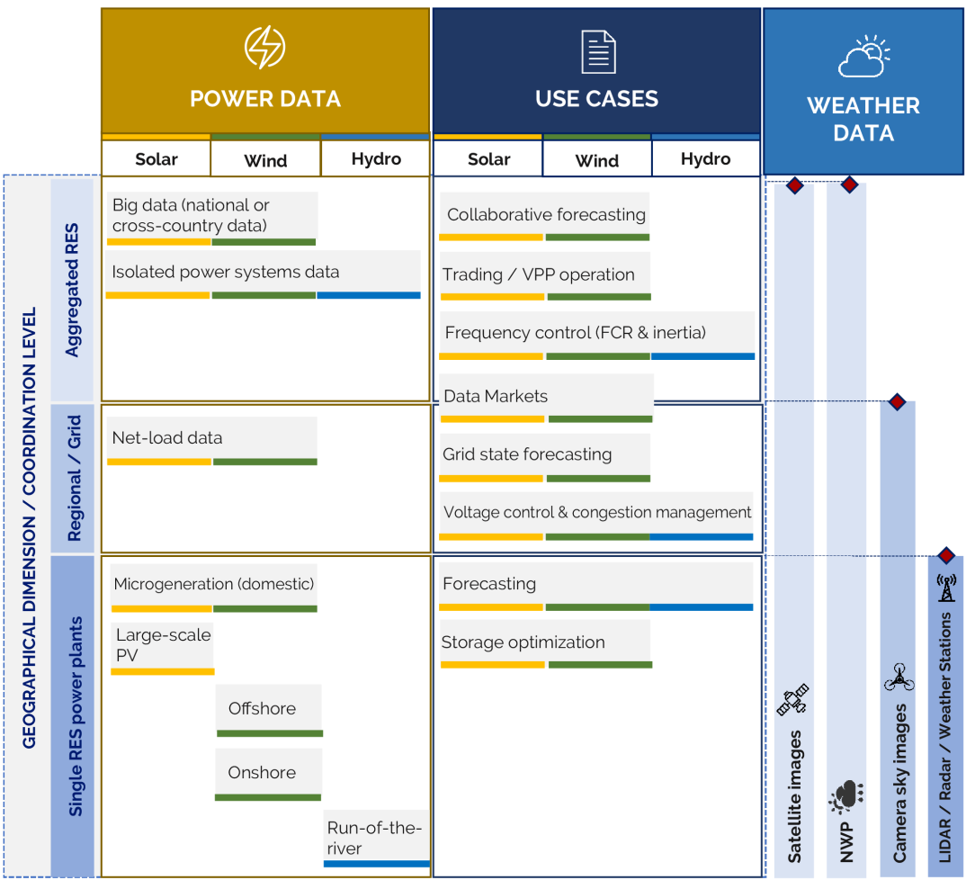Use cases
Covering all configurations from the perspective of any Smart4RES user
Smart4RES aims to develop and validate a set of tools for RES forecasting and decision-support by integrating the perspective of end-users through a number of innovative use cases.
The development follows a holistic approach which addresses the entire value chain of RES forecasting:
- Use cases span the multiple spatial dimensions of RES penetration: single renewable power plant, distribution grids, islands up to large aggregations at national level.
- Efficient links are established between modelling steps, such as the use of advanced and RES weather forecasting for optimized decision-making.
- The objective of Use Cases is to increase the value of RES forecasting. This is supported by original contributions such as high-resolution forecast (in space and time) and data-driven approaches for trading on electricity markets and grid management.
The aim is that the resulting modelling and forecasting tools are of general value, easily replicable, scalable and not application-specific.
Two families of use cases related to applications are considered to define the requirements for the forecasting solutions and decision-making tools that use these forecasts.

1. Use cases related to the predictive management of energy systems with at near-100% RES integration
These use cases involve critical challenges that emerge when energy systems are subject to high RES penetrations of up to 100%. Such challenges may include:
– A decrease in system inertia due to high shares of non-synchronous generation for frequency control;
– A decentralized small-scale RES creating local congestions in distribution grids.
The use cases concern various energy system configurations, where not only renewables are present but also storage, active demand options etc. The aim is to consider different systems like smart-homes with RES installations, microgrids, autonomous communities, hybrid power systems with RES and storage, geographical island systems and others.
For these systems the project will consider the operators or decision-aid tools requirements in terms of forecasts.
The aim is to be as exhaustive as possible in terms of use cases to cover the spectrum of forecasting requirements.
2. Use cases related to electricity markets
RES power plants participate directly in energy markets and it is more and more requested to comply with grid codes and “behave” as conventional power plants, i.e. by providing ancillary services to the grid. Moreover, the market designs at different countries may be different and although there is a tendency to converge to a common market in Europe, the developed forecasting technology should be applicable to markets outside Europe to give the opportunity for European companies that provide RES forecasting services to become world-wide players.
It is proposed to develop a practice focusing on human energy traders to make them systematic users of probabilistic approaches when trading in the electricity markets to facilitate its risk management thanks to tailor-made information.
The market-related use cases may involve not only RES plants but also hedging options to compensate forecasts errors that are penalised in markets. Hedging can be physical (storage, combination to conventional plants, aggregation through virtual power plants a.o.) or financial (i.e. participation in multiple markets, day-ahead, intra-day, ancillary services, local flexibility markets a.o.).
The market-related use cases will aim to cover requirements resolving from different markets, projected market designs, for portfolios involving different technologies and by integrating the human experience in the loop.
Data-driven bidding strategies for RES production on multiple electricity markets
Electricity Markets
Aggregated RES
Predictive flexibility management for voltage and congestion management
Grid Management
Regional/Grid
